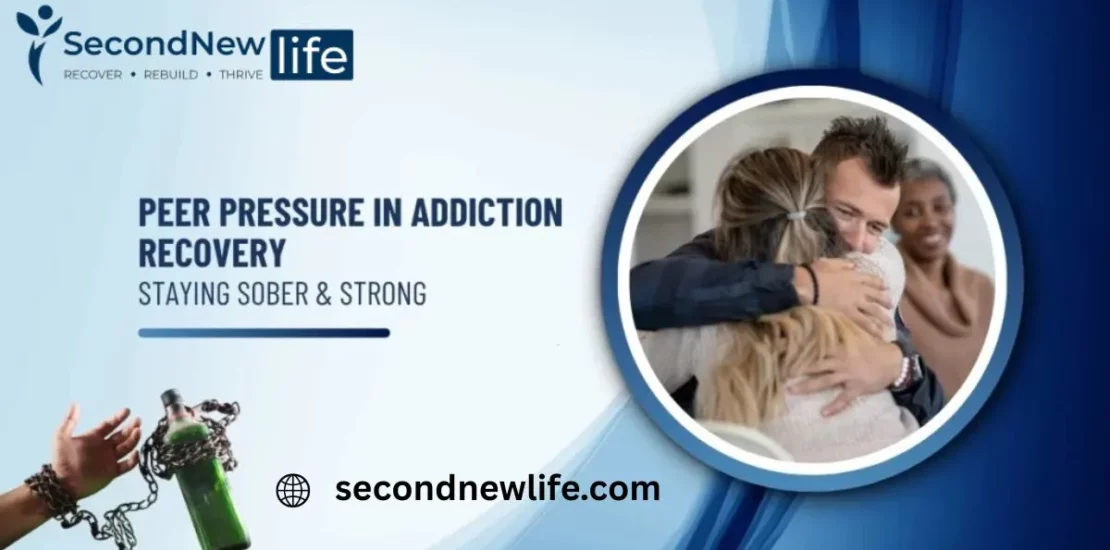How To Avoid Peer Pressure in Addiction Recovery? (Complete Guide)
- September 19, 2025
- Posted by: SecondNewLife
- Category: Uncategorized

Addiction recovery faces many challenges, but by defeating these challenges, you create a new life for yourself. Many challenges arise during this time, but one of them is peer pressure. This can come from friends, coworkers, and certain groups. This can be dangerous for you while recovering from addiction. During recovery, you should avoid relapse and focus on your addiction recovery. There are several key tips to help you avoid peer pressure in recovery that you should keep in mind. During such times, you should recognize peer pressure and not fear or resist it doing so will build your self-confidence. Always remember to cultivate healthy relationships, as these will help you recover. There are ways to avoid this and tips to avoid peer pressure.
Understanding Peer Pressure in Recovery
Peer pressure occurs when a person is influenced or pressured by others in a social group to do something. This group includes many people, such as friends and coworkers. Peer pressure forces a person to adopt habits they would rather avoid. They may adopt these habits at the behest of their peers and remain silent. But for a healthy person, a small incident can reignite their craving. Therefore, you must learn how to say no to peer pressure in sobriety.
Peer pressure takes many forms. Direct peer pressure involves doing things we don’t want to do, such as drinking alcohol and using drugs. Indirect peer pressure also follows the expectations of members of a group, who are doing things that are acceptable to them, even without any direct pressure. Positive peer pressure inspires the person to do work that is both profitable and positive for them. Negative peer pressure may motivate the person to do risky or harmful work.

Why Peer Pressure is Dangerous During Addiction Recovery
Initially, improvement is temporary. Restarting old habits or coming into contact with friends who use drugs can alter the addict’s nervous system. This greatly increases the risk of relapse. Negative peer pressure is dangerous during addiction recovery because it causes people to make wrong or harmful decisions and engage in things that involve more risky behaviour, substance abuse, and avoid rejection. Peer pressure is also risky because it weakens confidence and self-esteem. It makes a distance between you and your family or friends.
Pressure of peers has many effects on emotional and mental health, such as anxiety, stress, depression, and despair. The person begins to behave unhealthily. Due to peer pressure, the person faces many problems in his daily routine during recovery, which affects his mental health.
Tips To Handle Peer Pressure In Addiction Recovery
Building a Strong Support System
Creating a supportive environment is important when recovering from addiction, & support groups for recovery are essential. This includes building healthy relationships. You should talk to your family and befriend people who talk positively. You should join positive activities, join programs with family, and adopt a healthy lifestyle. All these things will help you avoid peer pressure during recovery.
Family plays a vital role in coping with and recovering. Family helps to make one strong and improve self-esteem. Increasing self-esteem makes decisions. Talking openly with family members about the pressure of colleagues will help you to be better at cooperation and stress-free. Pressure from peers can cause anxiety, stress, and depression; Therefore, you should have family meetings regularly and discuss issues with positive groups. This will help you a lot and create a strong support system.
Learning to Say “No” with Confidence
Learn to say “no” confidently. You should focus on your needs so that you can keep the conversation clear. So that you can say “no” directly. Saying “no” clearly and directly ends the conversation, and you do not make excuses or explain too much. Just remember to always use “I” statements. Whenever you talk, say “no” in a calm and steady voice. This requires practice, & in the beginning, avoid such things that are not right for you so that you gradually gain confidence & use confident body language.
Be sure that saying no does not make you selfish; you are just protecting your self-esteem & time. First, you need to know your priorities so you can clarify your goals, which will help you decide what’s right and what’s wrong for you. When talking, maintain eye contact, speak clearly, and use confident body language.
Knowing Triggers & Risky Situations in Addiction Recovery
First, identify triggers for peer pressure, then pay attention to personal feelings such as anxiety and difficulty getting along with others. Make a record in a journal of situations that lead you to want substances or feel pressure. These causes include low self-esteem & social media use. Internal causes include your own feelings or thoughts, such as insecurity, inadequacy, or low self-confidence. External triggers mean triggers that happen according to people or situations, like specific social settings, including parties and holidays, which increase the social dynamics more.
Healthy Coping Strategies to Replace Negative Influence
You should adopt Healthy Coping Strategies to help reduce negative effects. These strategies include physical activity, relaxation, and other activities. Strategies for overcoming peer pressure help you stay healthy and calm your mind.
Changing negative effects with healthy habits will help you overcome them. Here are some useful strategies, such as meditation, which help to calm your mind and remove all concerns. It has proven to be constant in reducing symptoms of stress, anxiety, and depression. To manage stressful moments, deep breathing is also necessary, and these exercises are also good for your nervous system. In addition, an auxiliary network means that you communicate with your family and friends and share your thoughts, and also improve your relationship with them, which will help you reduce negative effects.
Exercise also has a growth impact on mental health. It reduces stress, increases self-esteem, & improves sleep. Other healthy strategies to deal with negative effects include healthy diets, creative activities, determination, and aid. These healthy activities can help you maintain positive attention and reduce the effects of peer pressure.
Seeking Professional Help When Needed
When the pressure of colleagues increases a lot and you have trouble dealing with it, seek professional help. You should seek the help of a therapist or counsellor who can help you deal with challenging social conditions. They will also teach you how to cope with peer pressure in sobriety.
When the peers feel pressure, you should seek professional help, as timely help is required to recover from addiction. If you are having trouble identifying your unhealthy behaviour, self-respect, or boundaries, then you should seek professional help. This help will help reduce your stress or anxiety & improve your self-esteem. You should talk to a consultant or doctor about the pressure from your peers so that you can feel comfortable and recover from your addiction quickly.
Success Stories: Overcoming Peer Pressure in Recovery
Success stories are about people who make mistakes and then correct them. They recognise negative influences within themselves or take positive steps to overcome peer pressure. These stories also show how they overcome peer pressure and relapse prevention. Thus, they begin a new life in which they make new friends or focus on positive goals. These stories also talk about self-awareness or setting boundaries, which come with recovery.
These success stories are of a boy named Thomas Anderson. This boy was addicted to drugs with his friends since the age of 15 and used to listen to everything his friends said. For 4 years, he consumed drugs and alcohol with his friends, but when he thought of quitting all this, his friends started pressuring him, or saying he was refusing, but Tom had decided to do it. Thomas Anderson was ready to face the challenges and recover from his addiction with his family and new friends. This recovery journey has taught him many important things, like saying “no” to anything, setting healthy boundaries, being self-aware, and focusing on personal growth. Thomas Anderson made many mistakes in his journey, but learned a lot from them. This is why today he is enjoying his life and has left all those things and friends that were harmful to him.
Conclusion
Avoiding peer pressure is a major choice during recovery. During this time, you are building a support network, avoiding triggers, and learning to say “no”. All of this is to keep yourself safe or keep moving forward. During recovery, you have to learn a lot of new things or get away from a lot of things. So always put yourself first, or avoid things that can increase your addiction. Remember that your recovery is major to you and should be your priority. Always make the best choice or the right decision for yourself.

